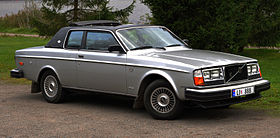Volvo 262C
| Volvo 262C | |
|---|---|
 1978 Volvo 262C Bertone (with US-spec headlights) | |
| Overview | |
| Manufacturer | Volvo / Bertone |
| Also called | Volvo Coupé |
| Production | 1977–1981 (6622 units)[1] |
| Model years | 1978–1981 |
| Assembly | Italy: Turin (Gruppo Bertone) |
| Designer | Jan Wilsgaard |
| Body and chassis | |
| Class | |
| Body style | 2-door coupé |
| Layout | FR layout |
| Related | Volvo 260 series |
| Powertrain | |
| Engine |
|
| Transmission |
|
| Dimensions | |
| Wheelbase | 2,640 mm (103.9 in) |
| Length | 4,890 mm (192.5 in) |
| Width | 1,710 mm (67.3 in) |
| Height | 1,440 mm (56.7 in) |
| Curb weight | 1,425–1,440 kg (3,141.6–3,174.7 lb) |
| Chronology | |
| Successor | Volvo 780 |
The Volvo 262C is the first luxury coupé made by Volvo. Based on the Volvo 200 Series, the 262C was built by Bertone in Turin for the 1977-1981 model years.[2]
Concept and design
A team of American executives and engineers led by Henry Ford II had visited a Volvo factory in the mid-1970s and had brought Continental Mark IVs to drive. The car generated interest among both the Volvo staff and the people living in the area. Without the facilities to spare on a low volume project, Volvo arranged with Bertone to build the coupe.[2]
The drivetrain, suspension, floor pan, and many of the body panels of the 262C were taken directly from the Volvo 260 sedan, with Bertone building the roof pillars, roof pan, windshield surround, cowl, and the upper parts of the doors.[2] The roof of the 262C is about 10 cm lower than that of the 260 sedan. On the occasion of Volvo's 25th anniversary in the United States, Volvo North America charged Newport Conversions of Santa Ana, California, with converting the 262C into a convertible to give as a gift to the company CEO. This version was called the 262C Solaire. Volvo's Swedish headquarters, however, vetoed the project due to safety concerns, and only five cars were built in the end.[3]

The 262C used the PRV engine, a V6 engine developed jointly by Peugeot, Renault, and Volvo.[2] The engine used a Lambda-sond oxygen sensor system; this was the first use of this system on a production V engine.[4]
Standard equipment included power windows and mirrors, central locking, full leather interior, cruise control, air conditioning, heated front seats, alloy wheels and electrically powered radio antenna. The only optional extras were a limited-slip differential, a choice of stereos, and the no-cost option of a Borg-Warner three-speed automatic instead of the four-speed manual with electrically operated overdrive.[2] By 1981, the manual option had been deleted in the US.[5]
Reception
Aimed mainly at the United States market, the 262C was Volvo's first entry in the luxury car market. About half of the annual production was earmarked for the United States.[5] It competed against the Cadillac Eldorado and the Mercedes-Benz 280CE. 6622 cars were produced from 1978 to 1980.[2]
Development

In 1979 the 262C was given a deeper trunk lid, wrap around taillights, and thermostatic heater controls. Manual transmission cars got the shift linkage from the 242GT.[2]
In 1980 the engine bore was increased from 88 mm (3.46 in) to 91 mm (3.58 in), resulting in a displacement increase from 2,664 cc (162.6 cu in) to 2,849 cc (173.9 cu in). The engine was also reconfigured, with seven main bearing instead of four and an increase in compression ratio from 8.2:1 to 8.8:1. Also in 1980 the front air dam from the 242GT was added to the 262C.[2] For North America, the 2.8-litre engine produces 130 hp (97 kW).[5]
In 1981, for the last year of production, the vinyl roof was deleted.[2]
References
- ^ "Volvo 262c" (PDF). Volvo Car Corporation. Retrieved 2018-01-08.
- ^ a b c d e f g h i McCourt, Mark J. (January 2006). "Volvo 262C Bertone Coupe". Hemmings. American City Business Journals. Retrieved 2014-09-14.
- ^ Nyblad, Fredrik (15 July 2019). "Volvo 262C Solaire – med himlen som tak!" [Volvo 262C Solaire - with the skies for a roof!] (in Swedish). Klassiker.
- ^ Hartford, Bill (February 1978). "Imports & Motorsports". Popular Mechanics: 42. Retrieved 2014-09-14.
- ^ a b c Hogg, Tony (ed.). "1981 Buyer's Guide". Road & Track's Road Test Annual & Buyer's Guide 1981 (January-February 1981): 127.
